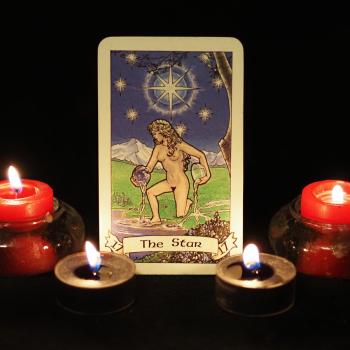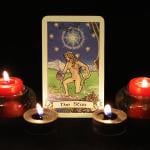
In a late-night conversation at Many Gods West, Witches & Pagans editor Anne Newkirk Niven threw out an interesting question: “Is the emphasis on piety bringing the concept of sin into polytheism?”
My immediate answer was “not yet.”
I don’t recall how the conversation went – it was late and there was more than a little alcohol involved. But after a few days to think about it, I’m sticking with my first response. We haven’t brought sin into Paganism and polytheism, but if we aren’t careful, we will.
Let’s start by talking about sin and several related but ultimately different terms. I could write a full post on each of these concepts (and in the case of purity, I already have), but that level of detail isn’t necessary to address this question.
Impiety is showing disrespect for the Gods, our ancestors, and our religious traditions. Of course, what is respectful and what is disrespectful varies widely by culture and tradition. Wearing the wrong clothes? Using the wrong titles and epithets in prayer? Failing to show hospitality to a stranger? In some traditions, eating food that has been offered to the Gods is highly disrespectful. In other traditions, not eating food offerings is just as disrespectful.
The lack of general agreement on what is pious and what is impious does not mean the subject is unimportant. It means you have to study the practices of your tradition, listen to your Gods, and think about what you’re doing before you do it.
Impurity is the presence of something that doesn’t fit well. That something isn’t necessarily bad: I like onions and I like chocolate cake, but I don’t like onions in chocolate cake. If you’re making spaghetti, wash your utensils before you start making the cake.
Not all impurities are so neutral. There’s a reason why we wash our hands after going to the bathroom and throw out food that’s been in the refrigerator too long. Some impurities can make us sick.
Spiritual impurities can make us spiritually sick. So we do house cleansings to clear out discordant energies. We cast circles to keep troublesome spirits out of our ritual workings. And we cleanse ourselves before we begin our worship, so we can present our best to our Gods.
A focus on maintaining purity is a good thing. But like overprotective parents who buy sanitizer by the barrel, taken too far it can keep us from developing much-needed immunities and resiliency.
Miasma is spiritual pollution. It’s the residue of impurity, and it can be transferred by contact even when something isn’t your fault. While every culture I’ve ever encountered has some concept of purity and impurity, Miasma is a Hellenic concept. It made its way into some of Greece’s Mediterranean neighbors, but it was virtually unknown in the Celtic world.
I think I’ve seen more writing on miasma in the last two weeks than I have in the previous ten years. Not all of it was helpful. If you’re Hellenic, you need more information on dealing with miasma than I can provide. If you’re not Hellenic, my suggestion is to focus on purity and leave miasma to others.
Sin is breaking the rules – even if those rules are arbitrary and outdated. Sin is transgression – even if the institution we transgress against is regressive and harmful. Sin is error and “missing the mark” – even if that mark is impossible to attain. The concept of sin tries to force a rainbow world into a black and white box.
Avoiding sin requires perfection, and since perfection is unattainable, we’re told we’re bad and evil. We feel shame for shortcomings we could not possibly avoid, some of which aren’t even shortcomings. Christianity’s answer is that a god-man will vicariously impart perfection to believers. The proposition works for some, although by their own admission they never completely stop sinning.
Paganism and all polytheisms I know say that perfection isn’t just impossible, it’s unnecessary. What is necessary is that we live virtuously and heroically. When we do something that’s truly wrong, we acknowledge it, apologize where appropriate, and make restitution and reparations.
To be fair, most moral codes began as an honest effort to maintain an orderly society. But inevitably, the rules were interpreted and enforced so as to help the powerful stay powerful. Mindless obedience is not a virtue, and it is no surprise that as Paganism began to be restored and reimagined, the concept of sin was one of the first Christian concepts to be discarded.
With these definitions out of the way, let’s go back to the question of bringing sin into Paganism.
Impiety and impurity are not the same things as sin. There is some overlap. But piety and impiety deal with a very specific category of actions: respect for the sacred. Purity and impurity have no moral connotations. There’s nothing evil about onions in chocolate cake, they’re just not very helpful there. And there is no such thing as “original impiety” or “original impurity.” We’re born human, with all the wonderful complexities that involves.
We need piety and purity. If something is meaningful to you, you respect it. If you don’t show the Gods and ancestors proper respect, at some level they’re not especially meaningful to you. If we treat the Gods with too much familiarity, we can forget that They’re Gods and we’re not. We can forget They do not always share our perspectives and our priorities.
Different traditions and different individuals have very different ideas about what is important and what is trivial. Some have exacting ritual requirements that must be maintained. Others focus more on this-world actions. Study the history of your tradition, and most importantly, listen to what your Gods require of you.
However…
Obsessing over piety and purity is the road to sin. If we become obsessed with piety and purity, we start to become more concerned with the rubrics of our rituals than with their content. If purity is of ultimate importance, we may be reluctant to make ourselves open and vulnerable in our devotions. If piety is of ultimate importance, we are likely to start seeing others’ impieties (which may not be impieties for them) as insults to our Gods and our traditions, and we may forget Isaac Bonewits’ caution that “our Gods are perfectly capable of defending Their own honor.”
An overemphasis on piety and purity drives a wedge between us and the Gods. While They are more than us, they are not the “wholly other” beings conservative monotheists claim for their God. You cannot have a relationship with wholly other beings. You can only obey or rebel, and which ever action you choose is not likely to affect the deity.
With such an obsession, piety and purity turn into rules which must be obeyed. In theory, there’s no reason why even meticulous religious rules can’t be an individual matter, and for a rare few they are. More frequently, someone ends up trying to impose their rules on everyone else in their tradition, and then on everyone else anywhere. That way lies sin. That way lies Savonarola, Cromwell, and Khomeini.
Let’s keep sin out of Paganism and polytheism. The concept of sin is still foreign to Paganism and polytheism. Let’s keep it that way. Let’s be as pious and as pure as we can be. But at the end of the day, let’s put living virtuously and heroically ahead of following anyone’s rules.
















